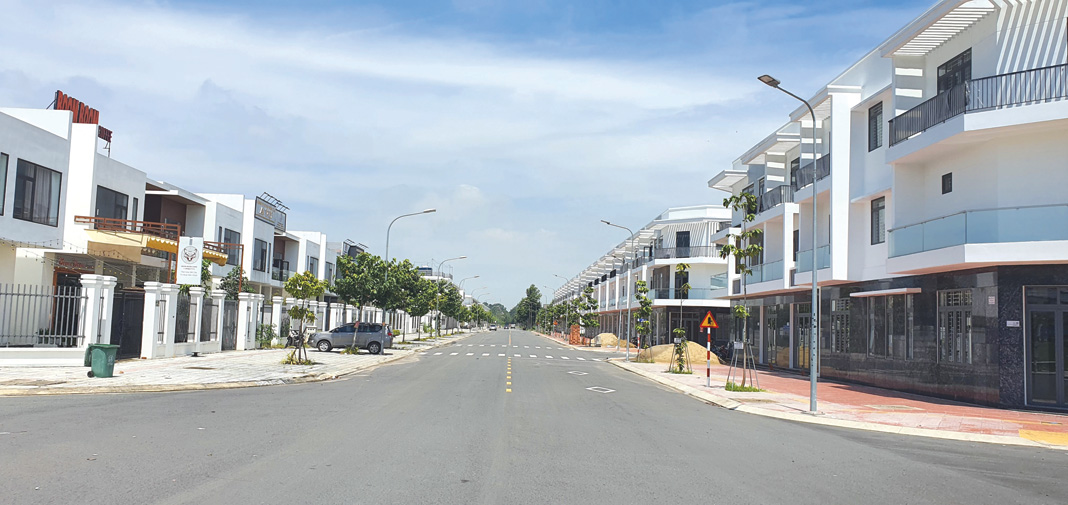Vietnam’s stock and property markets are struggling with volatile capital flows. If the situation is not properly tackled, dire consequences would be unavoidable. Coping solutions should be sought to ease capital flows. Should the property market be rescued at all costs?
A duck in water and momentary hardships
The index of the property management and development sector jumped by 150% between May 2020 and Januray 2022. The steep rise of both stock prices and property prices resulted in huge profits for both enterprises and stock investors in 2021. Several property enterprises reported profits amounting to trillions of Vietnam dong, with one reporting a hefty VND30 trillion, on top of high profitability in 2020 envied by businesses in other industries.
Since January 2022, however, stock prices in this sector have plunged by a half. Tighter credits have dragged homebuying. Lately, many real estate stocks have crashed to their floor prices on bourse for many sessions on end, and worries are mounting over the financial health of enterprises that have issued private placement bonds.
However, third-quarter business reports of listed property firms show most of big-cap (over VND10 trillion) entities have recorded a positive net profit. Such data indicates that the great pressure on real estate comes not from their business efficiency, but from access to capital and cashflow.
Dredging capital channel and screening
Credit growth on an annualized basis started to slow down in April, and this tempo tends to continue in the rest of the year if the 2022 credit growth cap of 14% is to be adhered to, since some earlier months have seen a steeper rate, at 16-17% year on year. To make matters worse, Tan Hoang Minh and Van Thinh Phat scandals occurred, sending the corporate bond segment into a tailspin. Many enterprises had to buy back bonds before maturity, and could not issue new bonds. The capital channel via two important debt instruments was stonewalled, hitting enterprises in other industries as well, and the panic also spread to the stock market, causing the steepest plunge among stock markets worldwide since May 2022.
If the capital blockage prolongs, consequences will be painful as cash-strapped enterprises cannot secure funds for operations, possibly culminating in a domino-effect collapse. However, it is noted that the corporate bond pressure is largely exerted on unlisted firms, while for listed firms, the pressure from the amount of bonds on the market can be absorbed by profits.
To facilitate capital flows on a selective basis for real estate enterprises, certain policies can be weighed as follows.
First, support for first-time buyers of houses via tax incentives or even a subsidy. This will stimulate demands and the cash flow will help improve liquidity for property firms.
Second, property prices in certain areas have surged by 20-25% a year, generating robust profits for property firms. Therefore, those firms facing the liquidity crunch must lower prices or profit margins in line with market principles, and incentives are not necessary for those enterprises that have enjoyed a higher profit margin than the market average.

Third, for enterprises unable to settle due bonds, it is recommended that their projects be restructured by asset management companies, with an option to be a swap of bonds for housing units. In case of disagreement, the asset management company can utilize such assets or transform them into a real estate investment trust.
Fourth, for enterprises still implementing their projects but without being allowed to renew credit contracts, their debts should be extended, with the priority given to those enterprises with near-completion projects.
As such, deblocking capital access for the real estate sector at a time of exhausted credit limit and corporate bond turbulence will aim at supporting first-time homebuyers while investors using financial leverage for a profit will have to discount their properties, which will help cool down the overheated property price.
More importantly, support policies need to be designed on a selective basis, without rendering support for all stakeholders at any cost. Ailing enterprises that have cashed in on policy loopholes in the recent past should be eliminated, while prestigious enterprises should be given a lifeline to survive momentary hardships.









